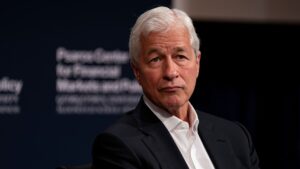Jamie Dimon Weighs In: Tariffs, Inflation, and National Security
In a recent interview at the World Economic Forum in Davos, JPMorgan Chase CEO Jamie Dimon made headlines with his candid views on the potential tariffs set to be introduced by President Donald Trump. In a discussion characterized by the tension between economic strategy and national security, Dimon’s comments highlight an essential dichotomy that investors must consider: the impact of tariffs on inflation versus their potential benefits to domestic security and trade negotiations.
Understanding the Tariff Landscape
As President Trump prepares to impose tariffs on trading partners like China, Canada, and Mexico, concern mounts over the possibility of a global trade war. Historically, tariffs are seen as a double-edged sword—they aim to protect local industries by making foreign goods more expensive but can also lead to higher consumer prices. Dimon, however, suggests that these measures may be necessary to reclaim leverage in trade talks. He stated, “If it’s a little inflationary, but it’s good for national security, so be it. I mean, get over it.” This remark encapsulates the attitude that some leaders in the financial and political arenas share: prioritizing national interests over potential short-term economic pain.
The Trade Deficit Dilemma
It’s crucial to consider the broader context behind the tariff discussions. The U.S. recorded a staggering $214 billion trade deficit with the European Union last year. As Trump prepares to introduce a 10% tariff on Chinese imports and a more formidable 25% on goods from Canada and Mexico, analysts are closely watching how these moves will influence not only inflation but also the dollar’s strength. Dimon reminded viewers that while tariffs can affect currency dynamics, growth remains the key concern for the economy.
The Historical Precedent
Reflecting on Trump’s first term, which saw broad-based tariffs without triggering spikes in inflation—staying below the 2.5% mark annually—Dimon indicated that the long-term economic implications of tariffs depend heavily on their implementation. Tariffs can serve as both a ‘weapon’ and a ‘tool,’ depending on the strategies employed by policymakers. As investors, understanding this nuanced perspective can guide decisions in a volatile market landscape.
Looking Ahead: What Will This Mean for Investors?
As the U.S. approaches the review of the USMCA (United States-Mexico-Canada Agreement) in July 2026, it is essential to remain vigilant. Tariffs that threaten economic stability can lead to fluctuations in market performance, but they can also create opportunities. Given Dimon’s emphasis on growth as a priority, investors may want to focus on sectors poised for expansion, such as domestic manufacturing or companies with resilient supply chains.
At Extreme Investor Network, we believe in empowering our readers with insights that go beyond headlines. Understanding the complexities of international trade, tariffs, and economic policy is essential for making informed investment decisions. As the landscape evolves, our community will provide ongoing analysis and updates, ensuring you have the knowledge you need to navigate this challenging terrain.
Conclusion: A Call for Informed Insight
In tumultuous times, it’s essential to sift through the noise and focus on facts and future projections. Tariffs may create inflationary pressures, but strategic implementations could safeguard national interests, leading to better trade negotiations. Dimon’s insights serve as a reminder to think strategically about the broader economic picture. Stay connected with Extreme Investor Network for exclusive analysis and depth on these crucial topics, ensuring you don’t just react but respond to the ever-changing market environment. Your informed investment strategy starts here!

